
Spaying & Neutering
At Sploot, our spay and neuter clinic offers expert, compassionate care using modern surgical techniques and one-on-one recovery support. Whether you're spaying a puppy or neutering a cat, our team is here to make the process safe, stress-free, and affordable.
Schedule a consultation today at any of our Denver, Chicago, or Colorado Springs locations.
Premium Spay & Neuter Services at Sploot
Not all spay clinics offer the same level of comfort, safety, or transparency. At Sploot, we use advanced tools, gold standard anesthesia, and minimally invasive techniques to ensure a smoother recovery. Our partnerships with ScratchPay and Affirm make pet care more accessible than ever.
Why Spaying or Neutering Your Pet Is Important?
Both spaying and neutering refer to the removal of the pet’s capacity to reproduce.
Why is Spay & Neutering important?
Spaying and Neutering helps protect pets from many serious illnesses, including mammary cancer and testicular cancer in females and males, respectively. Additionally, it reduces aggressive and unwanted behaviors, and prevents pet overpopulation in our communities.
Health and Behavioral Benefits
Schedule My Pet’s Spay or Neuter Today

Avoiding Accidental Breeding

Abiding by Municipal Legal Requirements

Premium Pet Surgery, Minus the Premium Price
💡Includes procedure, pre-op exam, and bloodwork
🛡️No hidden fees. Just expert care + full transparency.

Save big with SplootPack membership
That’s $600+ in savings— and the membership basically pays for itself before the year even begins.

Save big with SplootPack membership
That’s $600+ in savings— and the membership basically pays for itself before the year even begins.

Save big with SplootPack membership
That’s $600+ in savings— and the membership basically pays for itself before the year even begins.

Save big with SplootPack membership
That’s $600+ in savings— and the membership basically pays for itself before the year even begins.

Save big with SplootPack membership
That’s $600+ in savings— and the membership basically pays for itself before the year even begins.

Save big with SplootPack membership
That’s $600+ in savings— and the membership basically pays for itself before the year even begins.

Save big with SplootPack membership
That’s $600+ in savings— and the membership basically pays for itself before the year even begins.

Save big with SplootPack membership
That’s $600+ in savings— and the membership basically pays for itself before the year even begins.
When to Schedule Your Pet for Spaying or Neutering
We recommend that female dogs get spayed at 6 months of age. Meanwhile, male dogs can be neutered between the ages of 6 and 12 months.
Cats can be spayed or neutered a bit earlier, at around 5 months of age.
When you bring your pet in for pre-surgical consultation, our vets will assess other factors (such as breed or weight) that will affect the optimum time for a pet to get spayed or neutered.
If you're not sure when to neuter a dog or spay a cat, our veterinary team offers breed-specific timing guidance during your consultation.
What Makes Sploot’s Spay & Neuter Procedures Different?

Full health check-up and bloodwork before surgery to ensure your pet is ready for anesthesia.

Minimally invasive surgery under advanced anesthesia, reducing discomfort and ensuring faster recovery.

Advanced equipment like Ligasure and electrocautery minimize pain, bleeding, and healing time.

One-on-one monitoring during recovery, advanced pain relief, and clear aftercare instructions.
Your Pet’s Spay & Neuter Journey: From Consultation to Full Recovery
Consultation
Book online or call us to schedule your pet’s health check-up and pre-anesthetic blood work. Our team will answer any questions you have about the procedure or payment options and it is the ideal time to ask about costs and options for your cat neuter or dog spay.
Tailored Surgical Care
On surgery day, we use advanced surgical tools like Ligasure and laparoscopic techniques for safe, minimally invasive dog neutering and cat spay.
Expert Recovery Plan
Your pet receives close monitoring post-surgery with advanced pain relief like Nocita and cold laser therapy to help speed up healing after your pet’s neuter procedure. You’ll get clear aftercare instructions to support your pet’s recovery at home.
When to Schedule Your Pet for Spaying or Neutering
We recommend that female dogs get spayed at 6 months of age. Meanwhile, male dogs can be neutered between the ages of 6 and 12 months.
Cats can be spayed or neutered a bit earlier, at around 5 months of age.
When you bring your pet in for pre-surgical consultation, our vets will assess other factors (such as breed or weight) that will affect the optimum time for a pet to get spayed or neutered.
If you're not sure when to neuter a dog or spay a cat, our veterinary team offers breed-specific timing guidance during your consultation.
ADditional add-ons
Enhance Your Pet’s Recovery with These Additional Options
Enhance Your Pet’s Care: Ask About These Premium Upgrades During Your Consultation!
*Prices listed apply to Denver locations only and may vary by clinic. Prices are subject to change without notice based on medical conditions or individual pet needs. If additional services or adjustments are required during the procedure, the final cost will reflect those changes and may not be included in the original estimate.
How Sploot Compares to a Typical Spay Clinic
Unlike low-cost spay clinics, Sploot includes pre-surgical bloodwork, advanced anesthesia monitoring, and one-on-one recovery care in every spay and neuter package. Our modern clinics also offer upgrades like laparoscopic surgery and cold laser recovery — options that aren't always available elsewhere.
Sploot + ScratchPay: Premium Pet Spay & Neuter Care, Made Affordable

Learn More About ScratchPay Financing
FREQUENTLY ASKED QUESTIONS

Spaying and neutering are veterinary surgeries that carefully remove parts of the reproductive organs, with the purpose of providing better health and quality of life for pets. Spaying and neutering also prevent unwanted pregnancies and help reduce unethical breeding.

Spaying and neutering carry plenty of health benefits for dogs and cats, such as preventing certain types of cancers and infections. This is one of the main reasons why spaying and neutering are encouraged by the American Veterinary Medical Association (AVMA), the American Society for the Prevention of Cruelty to Animals (ASPCA), and other organizations.
Spaying and neutering can also help reduce potentially problematic behaviors that are tied to a dog or cat’s instinct to mate — such as a pet’s urge to escape or run away to seek a mate, urine marking, aggression, and mounting/humping other animals.
Last but not least, spaying and neutering are legally required in some municipalities. Make sure to check with your municipality to know if this procedure is mandatory in your place of residence.

Yes. Unless a medical issue prevents a pet from undergoing spaying and neutering safely, these procedures are mandatory for dogs and cats over the age of 6 months. Spaying and neutering are also required for getting the required pet license for dogs and pet license for cats in Denver.

In Chicago, spaying and neutering is not mandated, although there have been proposals in the past to make them so. Currently, pet parents are required to carry a pet license for pets over 4 months of age; spayed or neutered animals get discounted fees for this pet license.

The ideal age for spaying or neutering a pet varies on individual factors like breed, overall health, and so on. At Sploot, we do puppy/kitten wellness exams wherein our vets discuss the ideal time for spaying and neutering, along with other preventive care recommendations. In order to maximize the full health benefits offered by spaying and neutering, pet parents need to get their dog or cat spayed or neutered within the prescribed age.

Yes, it is still possible to spay or neuter an older pet. However, this could mean that a pet will not get the full spectrum of health benefits offered by these procedures when done earlier.

Most spaying and neutering procedures can be completed in under an hour, but are influenced by factors such as the size of the pet, the breed, and other medical considerations.

Yes. A pre-op appointment is crucial to ensure a successful and safe surgery.

The vast majority of spaying and neutering procedures are smooth, with no complications. There are rare instances that complications may arise because all types of surgery have potential complications. Should any post-surgical complications arise, reach out to our team and we’ll walk you through the next steps.

To an extent, spaying and neutering will help reduce potentially problematic behaviors such as the tendency to roam or escape, aggression, urine marking, and mounting other animals. This, however, does not mean that spaying or neutering is a cure-all for all problematic pet behaviors because a pet’s core personality, as well as non-mating-related habits, will likely remain the same after the procedure.

By themselves, spaying and neutering procedures do not cause weight gain in pets. Though these procedures may slow down a pet’s metabolic rate, it generally only takes a balanced diet and sufficient exercise to prevent unhealthy weight gain in spayed or neutered pets.

Spaying and neutering contributes to helping a pet live a long, healthy life. These procedures reduce the likelihood of some life-threatening diseases (e.g. uterine infection, testicular tumors, ovarian cancer, etc.); hence, helping pets avoid these diseases, through spaying or neutering, can save their lives.

Recovery from spaying or neutering takes around 10 - 14 days. Veterinarians will prescribe any needed medication for preventing infections and managing pain during this time. In addition, pet parents are advised to limit their pet’s activity, make sure the dog or cat is wearing recommended protective devices (e.g. cone collars, special clothing), avoid pet baths or contact with dirty water, and adhere to other instructions given by the veterinarian.

The price of spaying or neutering is affected by the pet’s weight, size, special medical needs, and so on. Here at Sploot, we offer transparent pricing from the get-go. Reach out to our team today to learn more!

Pet parents may be reimbursed by their pet’s insurance for spaying or neutering if this elective surgery is covered by their insurance plan.
It's important to note that not all pet insurance plans cover spaying and neutering. To make sure that your pet’s insurance covers this treatment, please contact your insurance provider.

Schedule your pet’s surgical consultation for spaying or neutering months, weeks, or days in advance. If you need an urgent appointment, we also accept same-day appointments!

We accept cashless payments only to ensure the safety of our clinics and clients. We happily accept all major credit and debit cards, along with CareCredit and ScratchPay.

Ready to Schedule at a Trusted Spay & Neuter Clinic?
Whether you're booking a dog spay, exploring cat neuter timing, or comparing options to a traditional spay clinic, our team is here to help. Sploot offers transparent pricing, modern care, and same-day consultations every day of the year.
Sploot Vets is locally trusted and led by a Fear-Free Certified team with extensive surgical experience. We’re here to make spay and neuter surgery safe, supportive, and accessible — every step of the way.







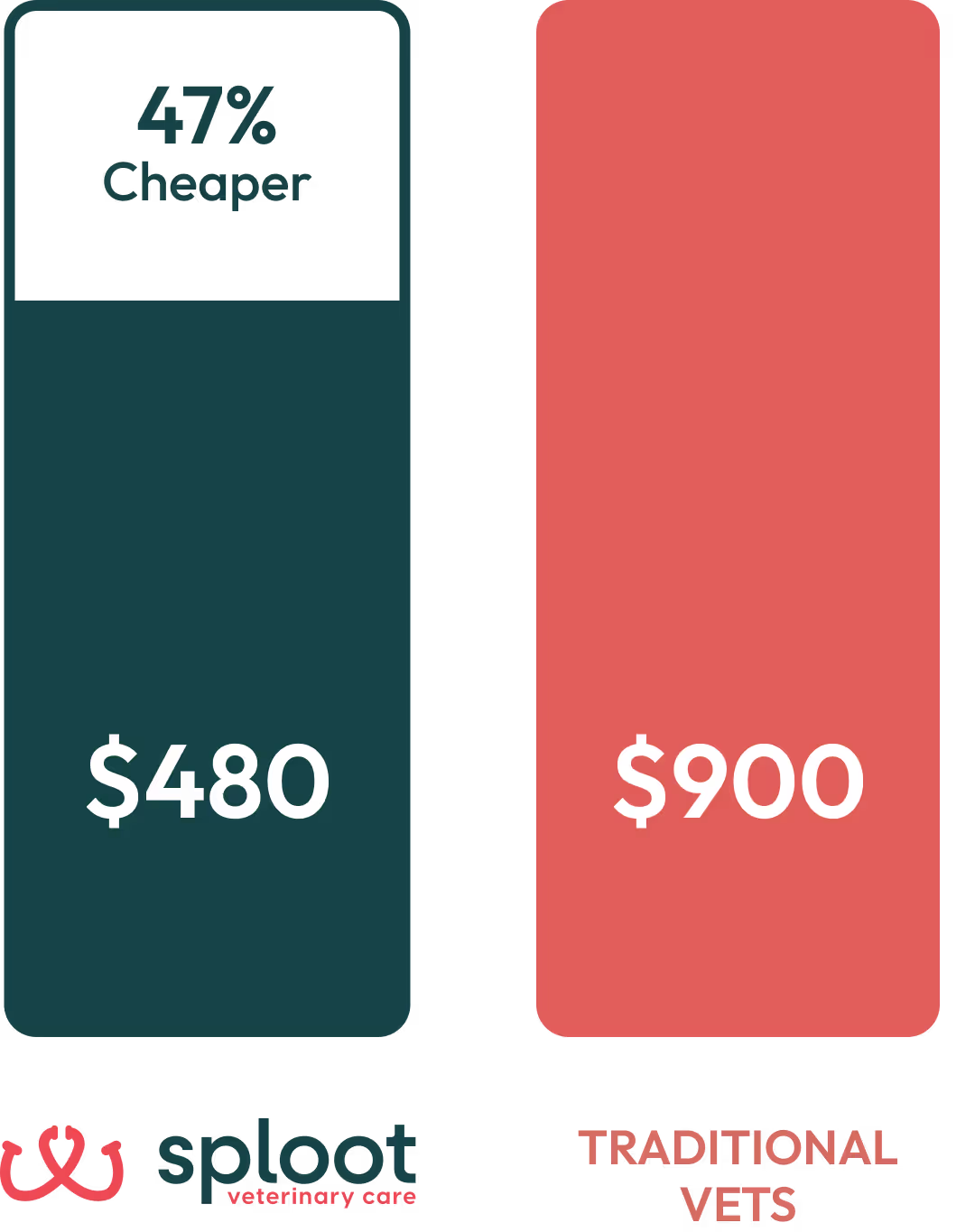

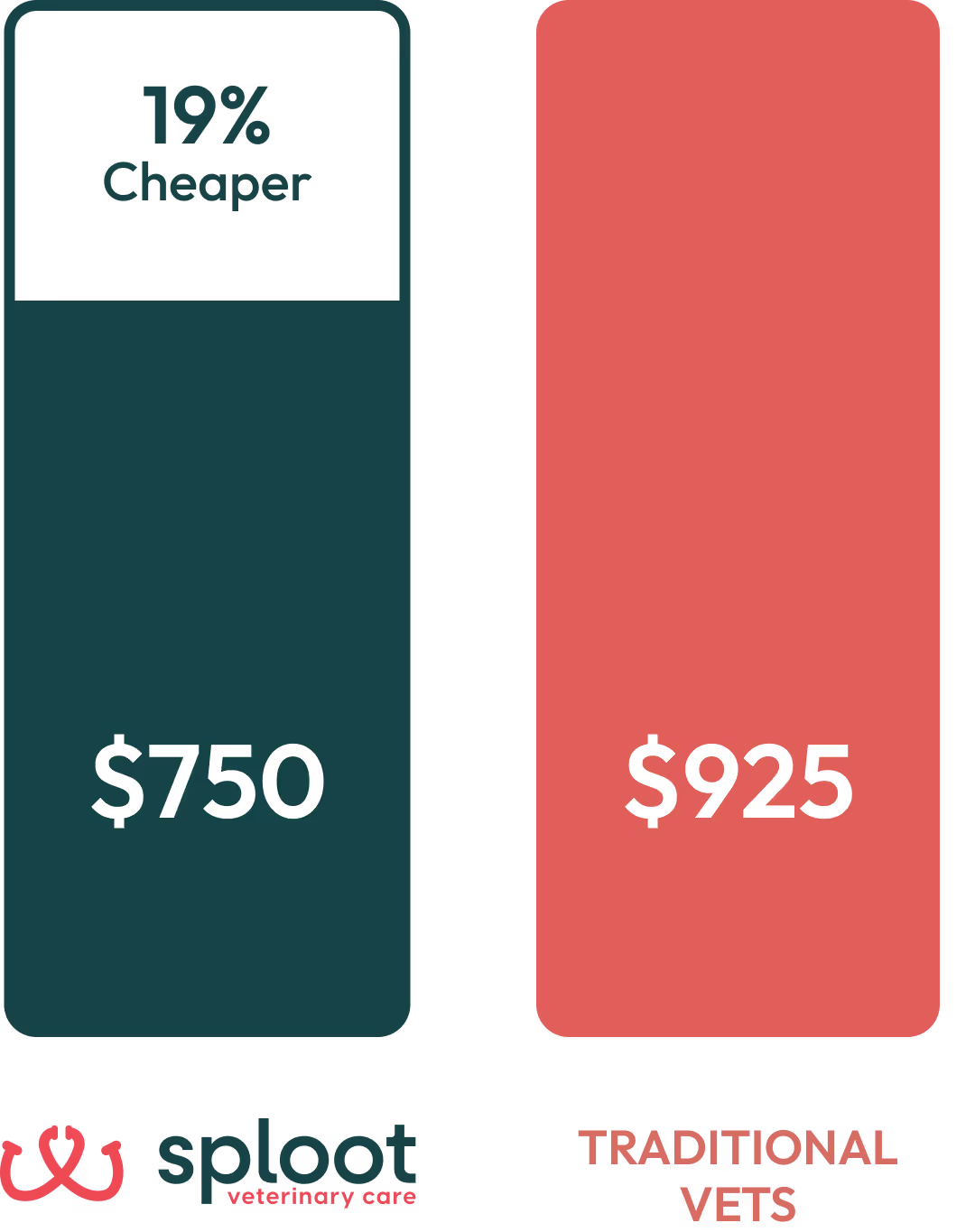

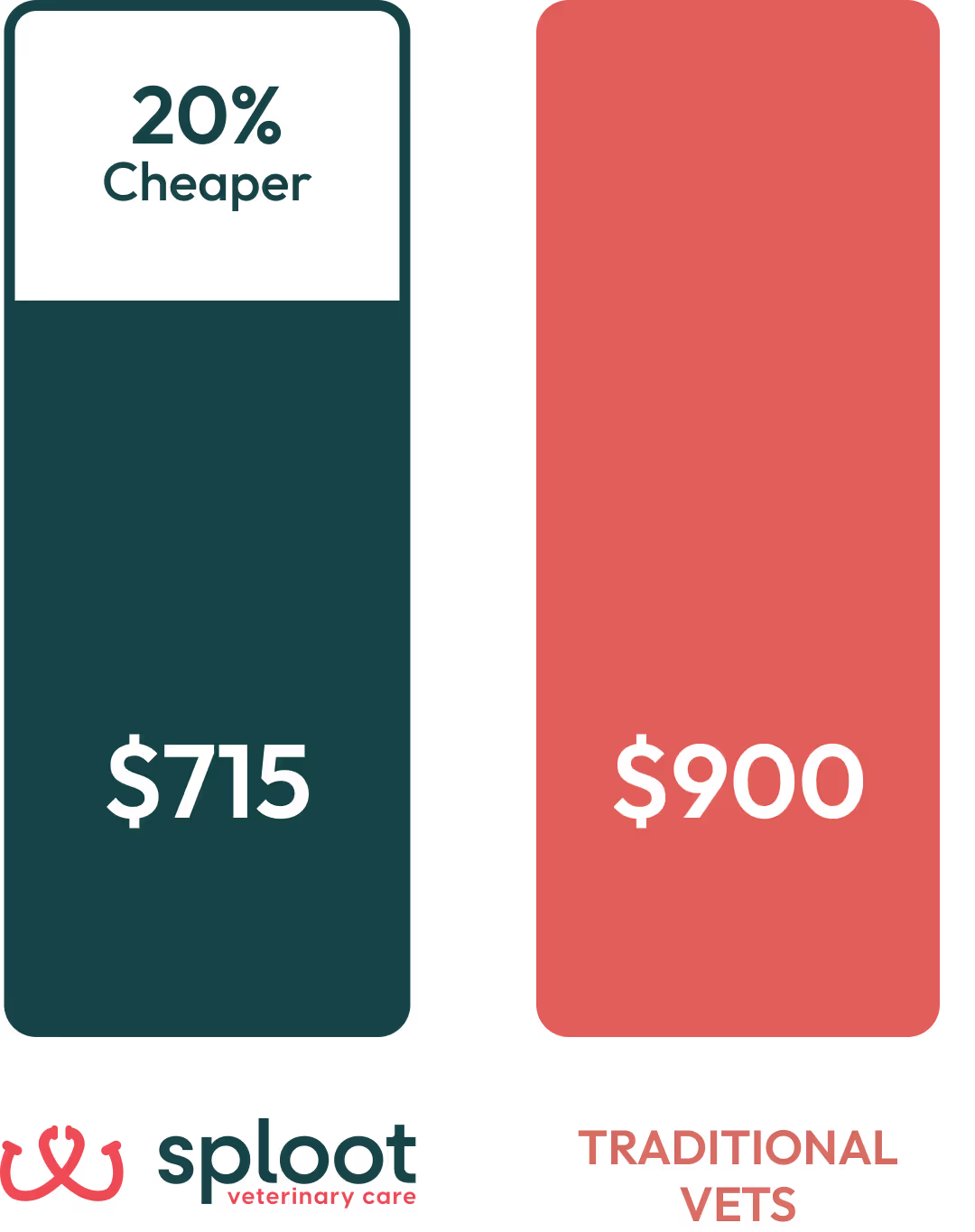

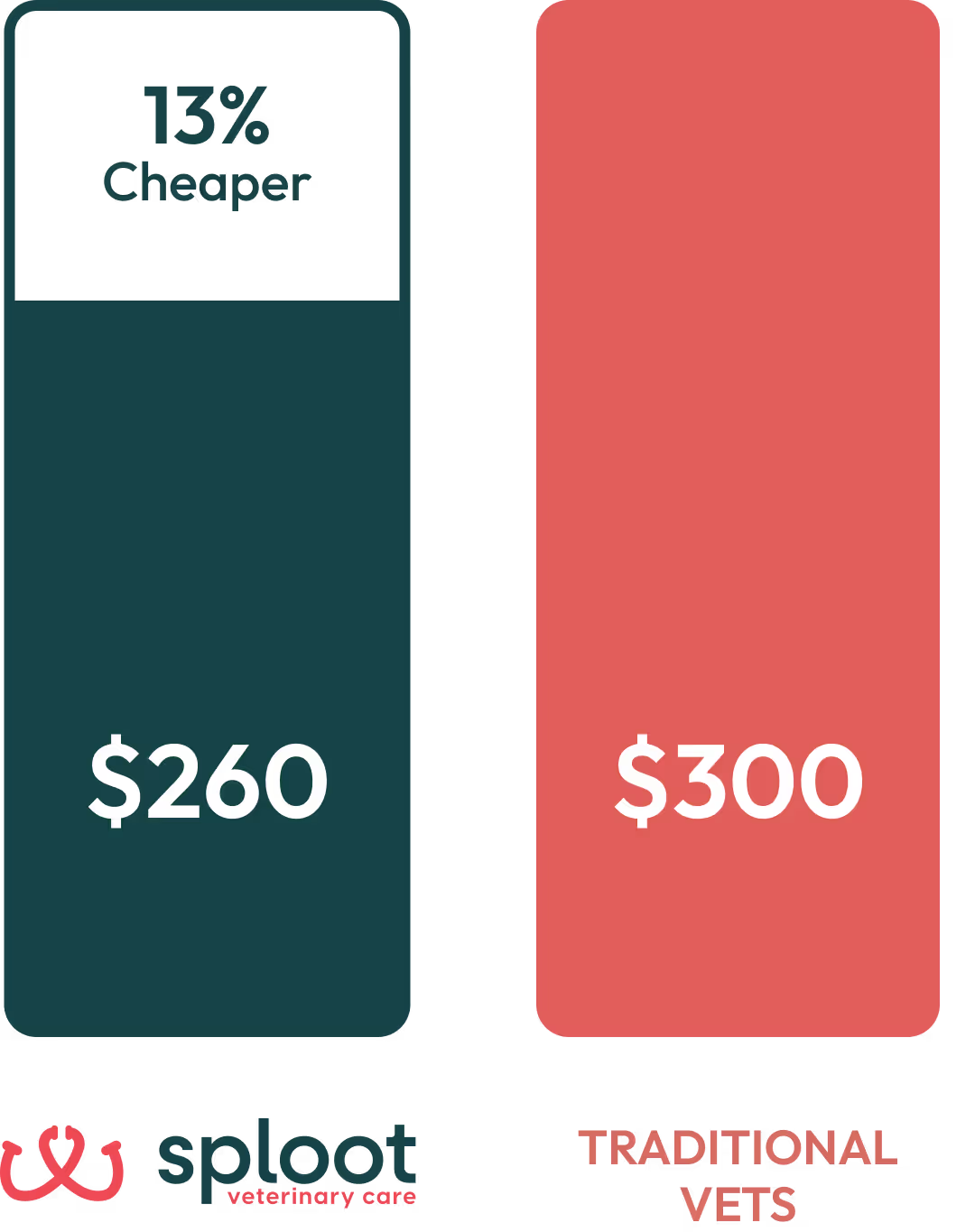



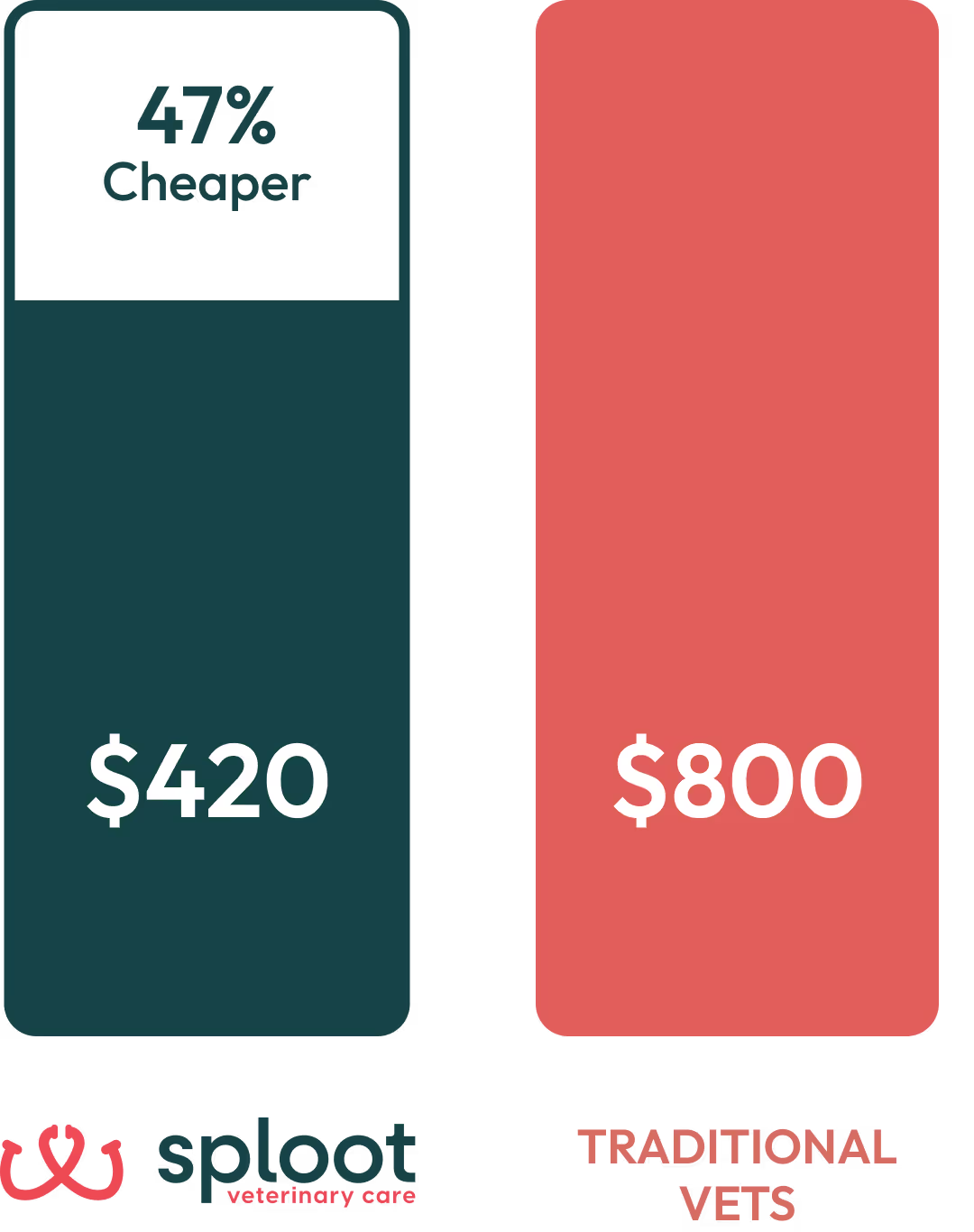



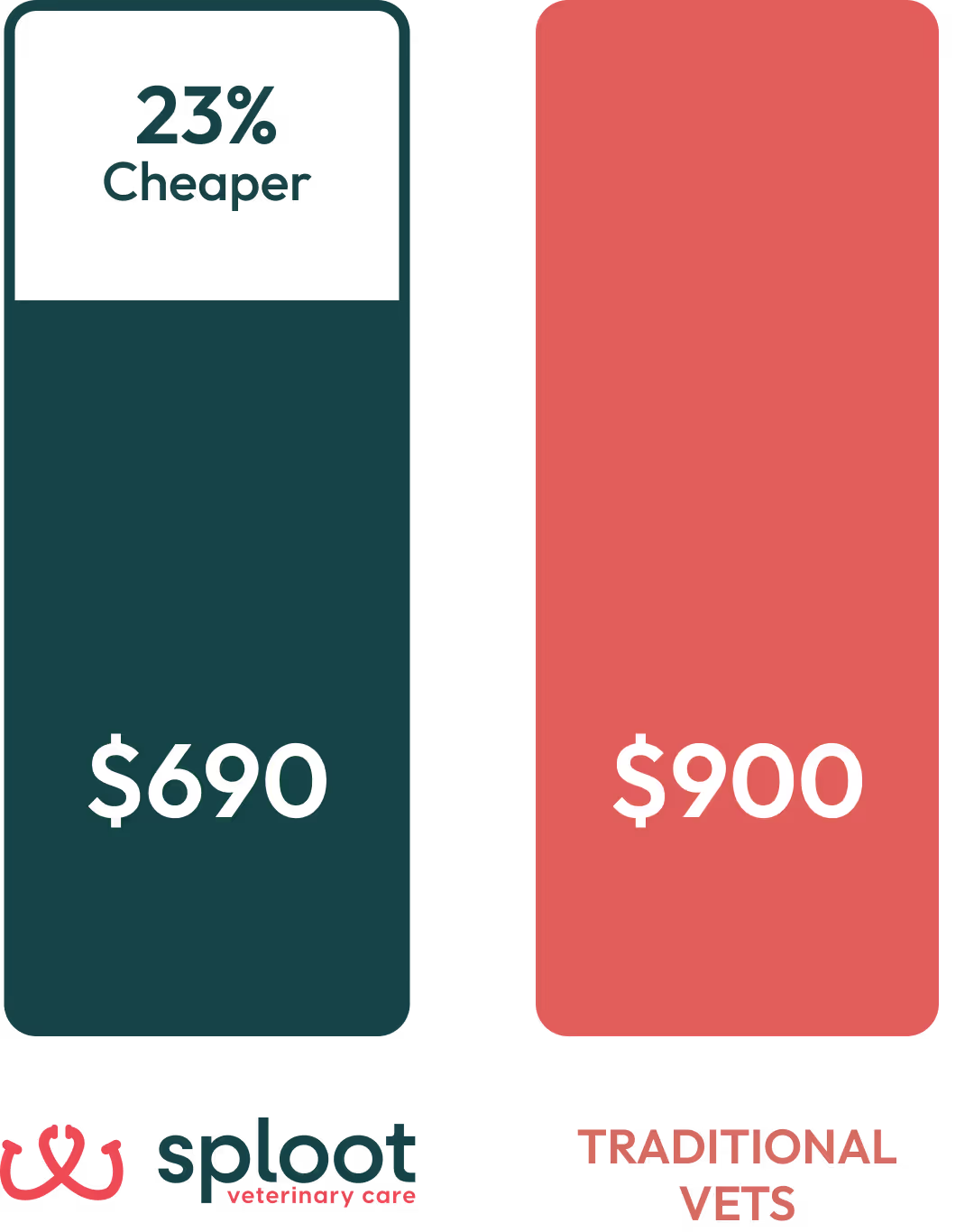
%20(1).webp)

